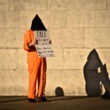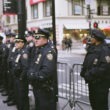A (Dead) Man, A (Response) Plan
Rep. Markey: Mr. Lutz died in 2005, four years before the plan was actually filed. How, Mr. Tillerson, can you justify in a response plan having a person who has been dead for four years? Is that also an embarrassment?
Mr. Tillerson: Well, it’s embarrassing.—Rep. Edward Markey questioning
ExxonMobil CEO Rex Tillerson
TWO DAYS BEFORE embarrassing his party with a public apology to BP CEO Tony Hayward, Representative Joe Barton was so obsequious to five oil company executives at a Congressional subcommittee hearing that he might have been mistaken for an aging male escort brought in to service the boys from Big Oil.
So obsequious that the chief executives of ExxonMobil, Chevron, Conoco Phillips, Shell, and BP America were clearly uncomfortable with the ranking minority member of a powerful House committee groveling before them. They thought they had been summoned to Washington for the standard ritual humiliation that is always gratifying to the public and sometimes leads to constructive legislation. And here was Barton, a Texas Republican, genuflecting before them, praising them as corporate citizens, and contrasting their “best practices” with the environmental plunder and lax workplace standards of Chinese oil companies.
Consider what Barton said to BP America’s Lamar McKay on a day that saw flow estimates from his company’s disastrous deepwater well increase to 35,000-to-60,000 barrels of crude oil a day.
First Barton observed that no subpoena was required to compel these men’s testimony. “You’ve chosen as free citizens to come and answer any question that any member of this subcommittee has,” Barton said. Then he singled out McKay. “In terms of BP, this television camera that’s showing the oil, isn’t that your television camera?”
Because BP had restricted access to the camera for days, leaving the public and Congress to divine how much oil was escaping from the damaged well, the Deepwater Horizon video feed had been almost as controversial as the low-balled estimates of the volume of oil gushing into the Gulf. McKay was understandably uncomfortable with the question. He said that the camera belongs to a contractor, not BP, and that access to the video feed was provided to the Interior Department and the Minerals Management Service “right off the bat”—when the Interior Department requested it. Off the bat didn’t happen for members of Congress or the public.
“We have responded to requests to open that up to the public and other Congressional members,” McKay said.
“But you’re providing it voluntarily,” Barton offered.
With his cross-examination of McKay behind him, the Congressman led the five committee witnesses toward the conclusion that the president’s “so-called moratorium on OCS [Outer Continental Shelf] drilling” is a threat to the nation’s energy security. Barton so carefully shaped his questions that two of the executives had no choice but to respond that they would move their idled drilling equipment to countries where the rigs can be put back in the game.
“There’s kinda good news-bad news,” Barton concluded. The bad news was the flawed judgment that resulted in the catastrophe in the Gulf. “The good news is, and I think that this is what our industry CEOs are saying [they weren’t], is that it’s preventable.” Barton explained that disasters can be avoided by writing rules that require double sleeves, lockout collars, degassing of mud, etc.
Let’s get this right. In response to a hydrocarbon Chernobyl, Joe Barton was proposing technical fixes and a quick return to deep-water drilling.
WAXMAN RULES—Henry Waxman wasn’t so eager to embrace the witnesses. With his opening question he began what felt like a cross-examination of the oil company executives. The California Democrat referred each of them to a letter that he and Representative Bart Stupak (D-MI) had sent to BP executive Tony Hayward the previous day. The 15-page, footnoted letter describes in detail the flaws in process and equipment at BP’s Deepwater Horizon platform. (See washingtonspectator.org.)
With the letter entered into the record, Waxman questioned each executive individually. Consider his refusal to let Chevron CEO John Watson evade a question:
Waxman: Mr. Watson, you were quoted in the Wall Street Journal saying that this incident was preventable. What mistakes did BP make that you wouldn’t have made?
Watson: First I would say that as we look at this incident, we need to let the investigation run its course …
Waxman: But you made the statement that this incident was preventable. What would you have done to prevent this?
Watson: Practices we would have put in place were not in place here.
Waxman: Specifically?
Watson: The casing design and the mechanical barriers put in place appear to be different from what we would use.
Waxman pressed on, describing technical arcana that included choices between lowering a full string of casing from the top of the well or hanging a liner and installing a tieback on top of the liner. He proceeded from witness to witness with the same line of questioning. At the end of five minutes, four oil company executives were on record describing BP’s process and choice of material as flawed.
The letter to BP, which Waxman also provided to the four other executives, obviously was written in consultation with drilling engineers. It included detailed accounts of BP employees overriding engineers from contracting firms also working on the well, to save the company time and money (in one instance $10 million to $12 million) while increasing the risk of a catastrophic blowout. The letter and material conveyed with it read like documental discovery in a civil suit (61 footnotes and 23 supporting documents from BP and contractors who had worked on its failed well). Taken together they provide a compelling argument that BP “repeatedly chose risky procedures in order to reduce costs and save time, and made minimal efforts to contain the added risk.”
Over budget and past deadline, BP played it cheap. The result was 11 deaths and the worst environmental catastrophe in U.S. history.
I AM THE WALRUS—Several news outlets had already found the walrus-protection guidelines in four of the Gulf of Mexico oil spill response plans the companies had filed with the Minerals Management Service. Yet Ed Markey’s question to ExxonMobil’s CEO was a headline grabber.
“ExxonMobil’s Gulf of Mexico oil spill response plan lists walruses under sensitive biological and human resources,” said Markey, a Massachusetts Democrat. “As I am sure you know, there aren’t any walruses in the Gulf of Mexico and there have not been for 3 million years.
“How can ExxonMobil have walruses in their response plan for the Gulf of Mexico?” Markey asked ExxonMobil CEO Rex Tillerson.
The notion of walruses in the Gulf was amusing, and a challenge for the executives whose plans included walrus-protection contingencies. (More agile CEOs might have used Florida manatees as a hedge against complete public humiliation.) Markey’s question wasn’t intended as comic relief. He was making the point that the spill-response plans were cut-and-paste jobs, 90 percent identical in content, including material from as far away as Alaska.
The plans not only overstate the range of walrus habitat, they wildly overstate the capacity to handle spills—from 150,000 to 250,000 barrels of oil per day. It was BP, in fact, that claimed it can manage a 250,000-barrel-per-day spill, roughly four times the high end of the current flow estimate at BP’s Deepwater Horizon disaster.
Markey chairs the Subcommittee on Energy and Environment. Waxman is the chairman of the full House Energy and Commerce Committee. Waxman learned to direct investigations and conduct hearings while serving as ranking minority member, and later, chairman of the Committee on Oversight and Government Reform. Over the past 20 years, he has established a reputation for competent and dedicated staffs that provide the factual underpinnings for thorough Congressional investigations.
If the Democrats lose control of the House in November, Henry Waxman will become the ranking minority member on the House Energy and Commerce Committee.
Joe Barton will become the committee chair.





0 Comments